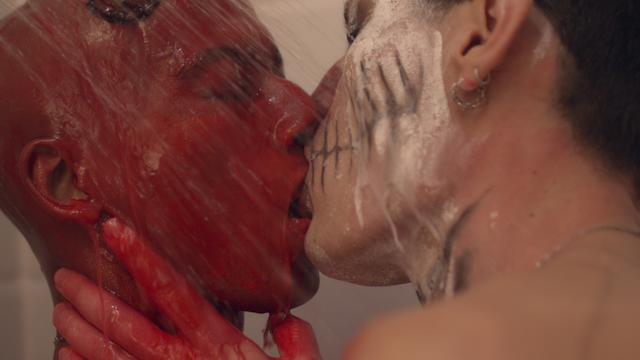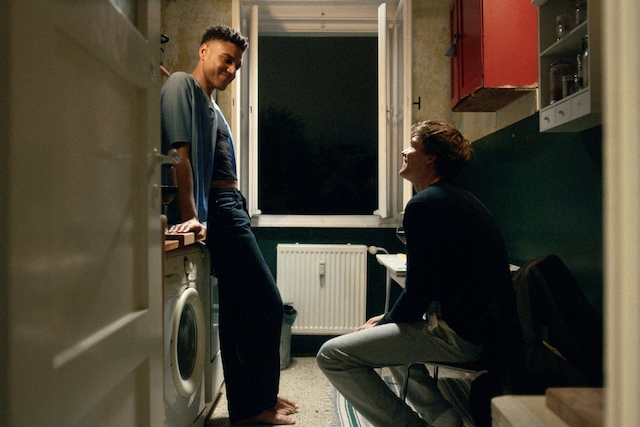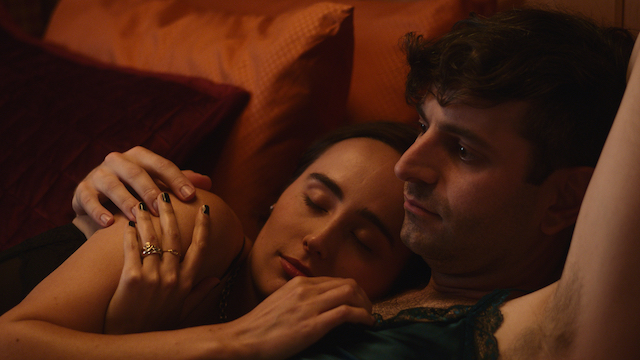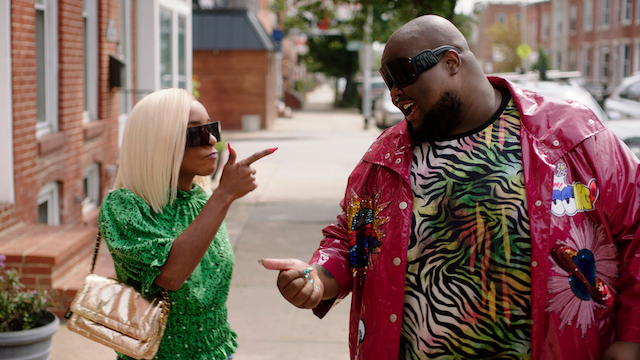
BY WINNIE McCROY | The Tribeca Film Festival (June 8-19) opened last week with a slate of short films, including a collection of seven LGBTQIA+ Shorts called See Me, Feel Me. The shorts deal with issues of gay intimacy, relationships, S/M, racism, cross-dressing, coming out, self-harm, and intersectional queerness. Although they are all quite different in tone and appearance, they form a cohesive narrative about what it means to be part of the gay community today.
The collection of shorts begins with director Leaf Liber’s My Dear Boy. It recaps the first few seconds two men meet, in which they experience the complete arc of their destined relationship. A sweaty man is buzzed into an apartment. A Black man opens the door. We see them embracing, making love, visiting the aquarium, fighting, and breaking up. “It makes me sad that we ever hurt each other, but I’m just really grateful we were together because you taught me so much about what I need and what I don’t need. We gave each other joy along the way. Thank you for loving me so much,” says one man to the other. They hold each other’s literal hearts as they flash back to the first moment they met.

The next film is director April Maxey’s Work, a drama about Gabriela, a woman unable to move on after her ex-girlfriend Jimena leaves her for a new woman, Crystal. Impulsively, Gabriela drops into an old job at a strip club, where she runs into a friend from her past. When a sexy dance performed for a client becomes something more, they must decide whether to take it further. In the end, Gabriela finds solace in nature, enjoying a breathtaking sunrise over the mountains.
Stop-motion photography and cut-figure animation mesh in Carrie Hawks’s Inner Wound Real, a look at three BIPOC folks who are into self-cutting, but later find new ways to cope. It can be hard to watch and triggering for some. In the first clip, a young man yearns so much to feel something that he pours burning water on his face, saying, “I didn’t want to exist, or if I was going to exist, I wanted to feel something.” Looking for a new way to express himself, he finds a group of “four people who saw me in a new light, who engaged me on a different level, and my whole world changed.” In the second sketch, Simone reveals she has been cutting herself since preschool, after living with her abusive, alcoholic father and being, “filled to the brim with emotions I couldn’t handle. So I would feel pain, but then feel relief for a while, a release.” After high school, the cutting ended, replaced by writing or drawing instead. But at the end, Simone admits, “Cutting made me feel relieved in a way that nothing else can, still.” Raychelle’s story is similar: As a queer person of color, she could not reconcile her parents’ idea of what her life would be. “With cutting there is control,” said Raychelle, asking, “Why replace one form of self-harm with another?”

Maissa Lihedheb directs the German-language film DogFriend (Hunde Freund), an unexpected meditation on race, politics, and history. A dark-skinned man’s white German lover rings the buzzer. Kissing him, the lover pulls out handcuffs, and asks his lover Malik to “be dominant, do whatever you like. Don’t be gentle.” Malik slaps him in the face, and the two have sex. After, Phillipp says he must go home to feed the street dog he found in Portugal, “sick and limping. Our eyes met and we knew we were meant to be together.” But Malik can’t find the key, and suggests he stay over. Phillipp says he must attend an early meeting to determine the fate of Turkish refugees. The anger rises as Malik says, “When you say Germany has no capacity, it sounds like the Nazis.” Phillipp wants to talk about racism, saying he has been discriminated against, too—as an East German. Malik tells Phillipp about a dream he had, in which Phillip was so thin he could see his veins, with teeth stumps like burnt matches. When talk turns to their “relationship,” Malik scoffs. “You know why you love dogs? Because you love owning things that can breathe,” says Malik. He drops the handcuff key with a smile.

Exploration of identity is the theme of Beck Kitsis and Chris McNabb’s Valentine. A couple drives through the snow to a resort cabin. After kissing, trans/nonbinary Corey (Jacob Tobia) dons a silky negligee. A viewing of the mirrored reflection elicits appreciation for the garment, but not the chest hair. Shaving it off, a task in the making for months, evokes a look from partner Mia (Sadie Scott) that is hard to bear, with the tenuous explorer noting, “I wanted to enjoy this, but I can’t do that without wondering how you’re feeling.” Mia, crying and closed off, later applies lotion to her partner’s irritated skin. The two pack up and leave. Just as the viewer wonders how their relationship will fare, hands are held—and, for one of them, kissed.
Science fiction rears its head with Naman Gupta’s Coming Out With The Help Of A Time Machine. A 25-year-old Indian man waits for his parents in a diner, preparing to finally come out to them. Disasters unfold, one after the other. Each time, he hits the “Reset” button on his watch/time machine and tries again. When he finally manages to tell his parents he is gay, his father replies, “How can you be? You don’t wear skinny jeans.” The emotions build as his parents yell, “Where did we go wrong?” Sid tells them, “I am who I am.” He relates how hard it has been to keep this inside over the past two years, even to the point where he almost committed suicide, sliding the note across the diner table to them. Sid thanks his parents for their many sacrifices: the way his dad drove a cab for 20 years so he could afford “the infrared telescope that I ended up using maybe twice,” and off-campus housing at MIT, and how his mom toiled six days a week in a lousy bakery and still made it to all his soccer games. His mother begs her husband to talk their son out of this, saying it will ruin his life—even pointing to another Indian family disowned by the community when their daughter came out. She leaves the diner but can’t forget the love she held for the son that she wanted so badly, she endured three miscarriages to get him. She returns and as she hugs her son close, he sees out of the corner of his eye his father, about to hit the “Reset” button.

This excellent collection of shorts wraps up with the best of the bunch, F^¢k ‘Em R!ght B@¢k. In director Harris Doran’s triumphant BIPOC (Black, Indigenous, and people of color) comedy, large, Black, bald Sammy is an aspiring Baltimore rap artist who takes an uninspiring day job with a relentless boss, just to pay the bills. After accidentally eating some cannabis-laced cake offered by his hottie hookup, he must rely on his friend Yolanda to help him get the weed out of his system before he gets drug tested the following morning. The problem, as Yolanda succinctly notes: “Pot is stored in your fat. So, the more fat you have, the longer it takes.” Using the two vacation days he’d requested for a gig in Delaware, Sammy stays home trying to wash the weed out of his system. Yolanda offers him her urine, until Sammy reminds her that the boss lady makes folks pee test with the door open. He finally tests negative and celebrates by taking candy from a baby. Unfortunately, the lemonade-stand treat he purchases is actually “mommy’s special treat.” He’s fucked again, until he returns to work and tells his boss he needs rehab. Thanks to the law, she can’t fire him. Yolanda rewards his positive attitude with a big pot brownie. He has finally won. He bites into it with relish, saying, “Fuck ‘em right back!”
Enjoy LGBTQIA+ Shorts: See Me, Feel Me on Sun., June 19, 6:30pm at Village East by Angelika: Theater 7. For tickets or information, visit https://tribecafilm.com/films/special-screening-lgbtqia-shorts-see-me-feel-me-2022. An At Home Shorts Pass, available for $25 and allowing you to view the program online, can be purchased here: https://www.tribecafilm.com/festival/tickets.
Chelsea Community News is made possible with the help of our awesome advertisers, and the support of our readers. If you like what you see, please consider taking part in our GoFundMe campaign (click here). To make a direct donation, give feedback, or send a Letter to the Editor, email scott@chelseacommunitynews.com.

You must be logged in to post a comment Login